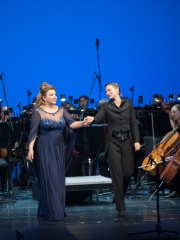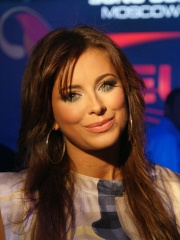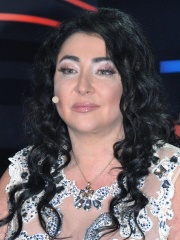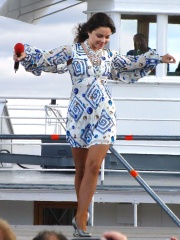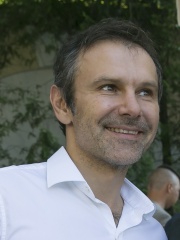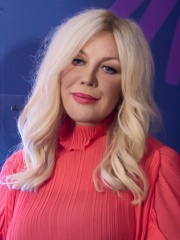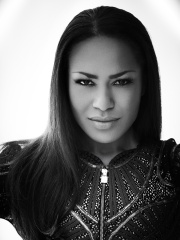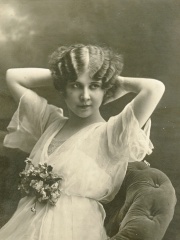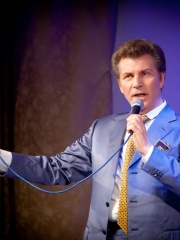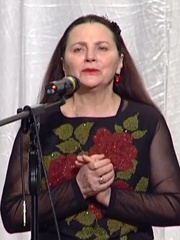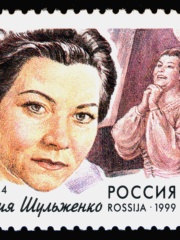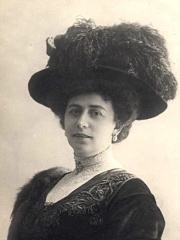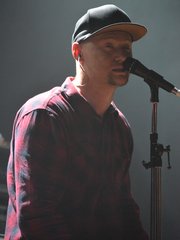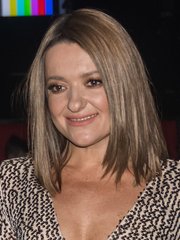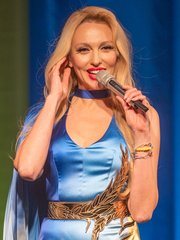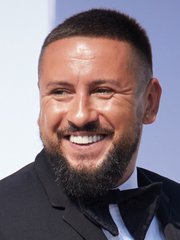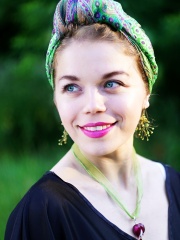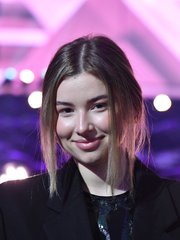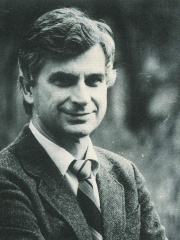
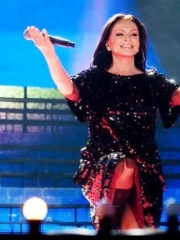
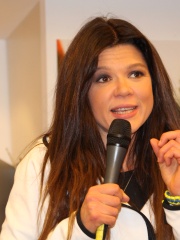
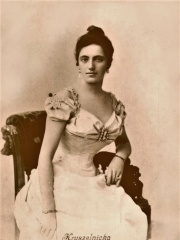
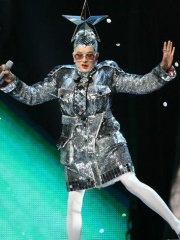
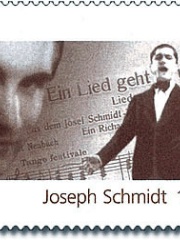
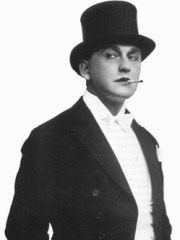
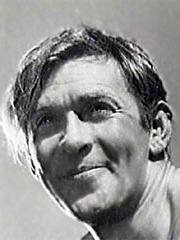
The Most Famous
SINGERS from Ukraine
Top 10
The following people are considered by Pantheon to be the top 10 most legendary Ukrainian Singers of all time. This list of famous Ukrainian Singers is sorted by HPI (Historical Popularity Index), a metric that aggregates information on a biography's online popularity. Visit the rankings page to view the entire list of Ukrainian Singers.

1. Anatoliy Solovianenko (1932 - 1999)
With an HPI of 72.03, Anatoliy Solovianenko is the most famous Ukrainian Singer. His biography has been translated into 120 different languages on wikipedia.
Anatoliy Borysovych Solovianenko (Ukrainian: Анатолій Борисович Солов'яненко; Russian: Анатолий Борисович Соловья́ненко; 25 September 1932 – 29 July 1999) was a Ukrainian operatic tenor, People's Artist of the USSR (1975), People's Artist of Ukraine, and Shevchenko National Prize winner. Father of Anatolii Solovianenko. He was born into a mining family in Donetsk and graduated from Donetsk Polytechnic Institute in 1954. He also studied singing with Alexander Korobeichenko from 1950. Solovianenko began his career in Donetsk, where there is now a monument in his memory. He made twelve performances at the Metropolitan Opera in Kyiv, then graduated from Kyiv Conservatory in 1978. For 30 years, he was soloist at the Taras Shevchenko National Opera and Ballet Theatre in Kyiv, and performed at Expo 67 in Montreal. During the 1977–78 season, Solovianenko performed as a soloist at the New York Metropolitan Opera. He also performed as soloist for the Alexandrov Ensemble during its UK tour 1988, singing "Kalinka" and other songs. He recorded 18 LPs of arias, romances and songs.

2. Sofia Rotaru (b. 1947)
With an HPI of 69.14, Sofia Rotaru is the 2nd most famous Ukrainian Singer. Her biography has been translated into 73 different languages.
Sofiia Mykhailivna Yevdokymenko-Rotaru (Ukrainian: Софія Михайлівна Євдокименко-Ротару [soˈfijɐ roˈtɑrʊ]; Russian: София Михайловна Евдокименко-Ротару; née Rotaru; born 7 August 1947), known simply as Sofia Rotaru, is a Ukrainian singer. Rotaru, nicknamed "Bukovinsky Solovey" ("the Nightingale from Bukovina"), emerged in 1966 as a pop folk star in the movie Solovei iz sela Marshyntsi (Nightingale from Marshyntsi) in the Romanian-speaking world after her manager and future husband Anatoliy Yevdokymenko made her change her music style from folk to pop music with Chervona Ruta. In 1972, she released the multilingual album Sofia Rotaru, re-released three times and covered by numerous singers, establishing herself as a viable pop artist in the countries of the former Soviet Union. She first gained international recognition after participating in 1968 in the International Youth Song Festival in Bulgaria and winning first prize at the Golden Orpheus in 1973 and second prize in the category of Polish songs at the Sopot International Song Festival in 1974. In the former USSR her career was marked by her stage success and numerous controversies. She has been acknowledged by the Kyiv Patriarchate. Rotaru has been performing for more than 40 years, and topped the Moscow airplay with "Ya nazovu planetu imenem tvoim" in 2008. She reported the highest income of all celebrities in Ukraine in 2008 and 2010. Her repertoire consists of more than 40 albums and 400 songs recorded in many languages. She has received awards, deemed a Meritorious Artist of the Ukrainian SSR, People's Artist of Ukraine, People's Artist of Moldavian SSR, Laureate of the Young Communist League Prize, Hero of Moldova, and Cavalier of the Republican Order of Moldova. In August 2002 former president of Ukraine Leonid Kuchma and President of Russia Vladimir Putin gave awards to Sofia Rotaru for her 55th birthday, bestowing upon her the high rank of the Hero of Ukraine for her "outstanding personal merits in the sphere of art", and the Russian order "For merits before the Nation", respectively. Rotaru's official surname is Yevdokymenko-Rotaru (Ukrainian: Євдокименко-Ротару). Yevdokymenko was the surname of her late husband. Yalta is her main residence, although she also has homes in Moscow, Kyiv, and Baden-Baden.

3. Ruslana (b. 1973)
With an HPI of 65.03, Ruslana is the 3rd most famous Ukrainian Singer. Her biography has been translated into 68 different languages.
Ruslana Stepanivna Lyzhychko (Ukrainian: Руслана Степанівна Лижичко, IPA: [rʊsˈlɑnɐ steˈpɑn⁽ʲ⁾iu̯nɐ lɪˈʒɪtʃko]; born 24 May 1973), known mononymously as Ruslana, is a Ukrainian singer, songwriter, producer, activist and former politician. She is a World Music Award and Eurovision Song Contest winning recording artist, holding the title of People's Artist of Ukraine. She is also a former MP serving as deputy in the Ukrainian parliament (Verkhovna Rada) for the Our Ukraine Party. Ruslana was the UNICEF Goodwill Ambassador in Ukraine in 2004–2005. She is recognized as the most successful Ukrainian female solo artist internationally and was included in the top 10 most influential women of 2013 by the Forbes magazine. The U.S. Secretary of State honored her with the International Women of Courage Award in March 2014. She has been named an honorary citizen of her hometown Lviv and was nominated to receive the title Hero of Ukraine. Ruslana writes, composes and produces her own songs and music videos. Since 28 December 1995 she has been married to Oleksandr Ksenofontov, a Ukrainian record producer. Together they have run the company Luxen Studio since 1993, producing radio and film trailers. Ruslana was the first artist from the former Soviet Union to officially receive a platinum disc, her Dyki tantsi album selling more than 170,000 copies in the first 100 days after its release. This album is the best selling Ukrainian album to date, together with its English version, more than 500,000 copies being sold solely in Ukraine. She won the 2004 Eurovision Song Contest with the song "Wild Dances" receiving 280 points, which at that time was a record of points. Following her victory, she rose to fame in Europe and became one of the biggest pop stars from the Eastern part of the continent. Her winning song "Wild Dances" dominated the European charts for 97 weeks peaking at number one in Belgium for 10 consecutive weeks. Her Eurovision winning song was included on the official compilation album called The Very Best of Eurovision celebrating the 60th anniversary of the contest. Her repertoire includes songs performed mainly in Ukrainian and English, but she also recorded cover versions in Spanish and Latin languages.

4. Solomiya Krushelnytska (1872 - 1952)
With an HPI of 63.92, Solomiya Krushelnytska is the 4th most famous Ukrainian Singer. Her biography has been translated into 30 different languages.
Solomiya Krushelnytska (Ukrainian: Соломія Амвро́сіївна Крушельницька; September 23 [O.S. September 11] 1872 – November 16, 1952) was a Ukrainian lyric-dramatic soprano, considered to be one of the brightest opera stars of the first half of the 20th century. During her life, Krushelnytska was recognized as the most outstanding singer in the world. Among her numerous awards and distinctions, in particular, the title of "Wagner's diva" of the 20th century. She is credited with rescuing Puccini's Madama Butterfly from its failed debut at La Scala. The opera's re-creation in Brescia starring Krushlenytska received widespread acclaim. Singing with her on the same stage was considered an honor for Enrico Caruso, Titta Ruffo, Fedor Chaliapin. Italian composer Giacomo Puccini presented the singer with his portrait with the inscription "The most beautiful and charming Butterfly".
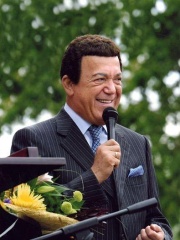
5. Joseph Kobzon (1937 - 2018)
With an HPI of 63.49, Joseph Kobzon is the 5th most famous Ukrainian Singer. His biography has been translated into 32 different languages.
Joseph Davydovich Kobzon (11 September 1937 – 30 August 2018) was a Russian singer, known for his crooner style.

6. Verka Serduchka (b. 1973)
With an HPI of 60.91, Verka Serduchka is the 6th most famous Ukrainian Singer. His biography has been translated into 45 different languages.
Andriy Mykhailovych Danylko (Ukrainian: Андрі́й Миха́йлович Дани́лко; born 2 October 1973), better known as his drag persona Verka Serduchka (Ukrainian: Вєрка Сердючка, romanized: Vierka Serdiuchka, IPA: [ˈwʲɛrkɐ serˈdʲutʃkɐ]; Russian: Верка Сердючка, romanized: Verka Serdyuchka, IPA: [ˈvʲerkə sʲɪrˈdʲʉtɕkə]), is a Ukrainian comedian, actor, and singer. He represented Ukraine in the Eurovision Song Contest 2007 as Verka with the song "Dancing Lasha Tumbai", finishing in second place. He has sold over 600,000 records. He has appeared in films, most notably a cameo as Verka in the American comedy film Spy (2015).

7. Joseph Schmidt (1904 - 1942)
With an HPI of 60.14, Joseph Schmidt is the 7th most famous Ukrainian Singer. His biography has been translated into 20 different languages.
Joseph Schmidt (4 March 1904 – 16 November 1942) was an Austro-Hungarian and Romanian Jewish tenor.

8. Alexander Vertinsky (1889 - 1957)
With an HPI of 59.59, Alexander Vertinsky is the 8th most famous Ukrainian Singer. His biography has been translated into 20 different languages.
Alexander Nikolayevich Vertinsky (Russian: Александр Николаевич Вертинский; March 20 [O.S. March 8] 1889 – May 21, 1957) was a Russian and Soviet artist, poet, singer, composer, cabaret artist and actor who exerted seminal influence on the Russian tradition of artistic singing.

9. Leonid Utyosov (1895 - 1982)
With an HPI of 58.69, Leonid Utyosov is the 9th most famous Ukrainian Singer. His biography has been translated into 22 different languages.
Leonid Osipovich Utesov, also spelled Utyosov or Utiosov, born Lazar (Leyzer) Iosifovich Vaysbeyn or Weissbein (21 March [O.S. 10 March] 1895, Odessa – 10 March 1982, Moscow), was a famous Soviet estrada singer, and comic actor, who became the first pop singer to be awarded the prestigious title of People's Artist of the USSR in 1965.
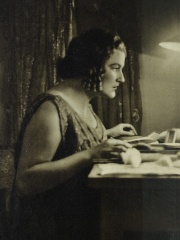
10. Viorica Ursuleac (1894 - 1985)
With an HPI of 58.26, Viorica Ursuleac is the 10th most famous Ukrainian Singer. Her biography has been translated into 17 different languages.
Viorica Ursuleac (26 March 1894 – 22 October 1985) was a Romanian operatic dramatic soprano.
People
Pantheon has 63 people classified as Ukrainian singers born between 1872 and 2004. Of these 63, 46 (73.02%) of them are still alive today. The most famous living Ukrainian singers include Sofia Rotaru, Ruslana, and Verka Serduchka. The most famous deceased Ukrainian singers include Anatoliy Solovianenko, Solomiya Krushelnytska, and Joseph Kobzon. As of April 2024, 9 new Ukrainian singers have been added to Pantheon including Andriy Khlyvnyuk, Natalia Mohylevska, and Olya Polyakova.
Living Ukrainian Singers
Go to all RankingsSofia Rotaru
1947 - Present
HPI: 69.14
Ruslana
1973 - Present
HPI: 65.03
Verka Serduchka
1973 - Present
HPI: 60.91
Maria Guleghina
1959 - Present
HPI: 58.07
Ani Lorak
1978 - Present
HPI: 54.92
Lolita Milyavskaya
1963 - Present
HPI: 54.37
Natasha Korolyova
1973 - Present
HPI: 52.12
Svyatoslav Vakarchuk
1975 - Present
HPI: 52.06
Alla Kudlai
1954 - Present
HPI: 51.19
Taisia Povaliy
1964 - Present
HPI: 50.72
Gaitana
1979 - Present
HPI: 50.48
Svetlana Loboda
1982 - Present
HPI: 50.22
Deceased Ukrainian Singers
Go to all RankingsAnatoliy Solovianenko
1932 - 1999
HPI: 72.03
Solomiya Krushelnytska
1872 - 1952
HPI: 63.92
Joseph Kobzon
1937 - 2018
HPI: 63.49
Joseph Schmidt
1904 - 1942
HPI: 60.14
Alexander Vertinsky
1889 - 1957
HPI: 59.59
Leonid Utyosov
1895 - 1982
HPI: 58.69
Viorica Ursuleac
1894 - 1985
HPI: 58.26
Lydia Lipkowska
1882 - 1958
HPI: 58.18
Yaroslav Yevdokimov
1946 - 2025
HPI: 57.80
Nina Matviienko
1947 - 2023
HPI: 57.07
Klavdiya Shulzhenko
1906 - 1984
HPI: 56.27
Antonina Nezhdanova
1873 - 1950
HPI: 56.05
Newly Added Ukrainian Singers (2025)
Go to all RankingsAndriy Khlyvnyuk
1979 - Present
HPI: 45.14
Natalia Mohylevska
1975 - Present
HPI: 45.06
Olya Polyakova
1979 - Present
HPI: 43.29
Monatik
1986 - Present
HPI: 42.25
Artem Pyvovarov
1991 - Present
HPI: 42.11
Katya Chilly
1978 - Present
HPI: 41.49
Oleksandr Yarmak
1991 - Present
HPI: 39.34
Olena Tokar
1987 - Present
HPI: 35.91
Maria Sur
2004 - Present
HPI: 32.55
Overlapping Lives
Which Singers were alive at the same time? This visualization shows the lifespans of the 15 most globally memorable Singers since 1700.

